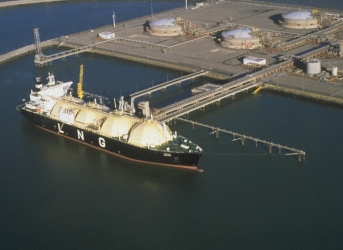Russian state-owned oil and gas giant Gazprom is currently working out the matter of creating a liquefied natural gas (LNG) distribution hub in Bahrain. The hub will be meant to intake LNG from various sources, including Russia.
The news was announced by Saint Petersburg’s Regional Governor, Georgiy Poltavchenko, following a visit of the region’s delegation to Bahrain.
Russia is currently negotiating the possibilities of LNG deliveries to the island nation in the Persian Gulf, with possible financing provided by Russia’s Vnesheconombank (VEB). The possibility of Russian independent natural gas producers has also been taken into consideration. Various instrument and equipment manufacturers from the Saint Petersburg region could also partake in the project.
The exact volume of LNG deliveries is hard to evaluate at the moment; according to preliminary estimates, it could amount to several billion cubic meters annually. Related: Should Exxon Mobil Shareholders Be Worried About a Ratings Cut?
Bahrain’s own natural gas stock is limited and the country is dependent on deliveries from the outside. However, talks with neighboring gas-exporting countries – Qatar and Iran, have met with difficulties due to political differences.
Back in February 2011, it was reported that Russia will begin exporting its LNG to Bahrain, but anti-government movements in the Middle Eastern nation got in the way of the project’s further development.
In 2014, during its visit to Bahrain, the Russian business delegation held negotiations regarding possible deliveries of Russian LNG, however, no binding agreements were signed at that time.
Nonetheless, Bahrain isn’t letting the issue go, and in February 2016 it became known that they had offered Russia to use the LNG reception terminal for purposes of exporting gas to Gulf countries. The terminal is in its construction phase and is planned to be commissioned in the first half of 2018, with construction costs amounting to $600 million.
Eastern Front
At the same time, Gazprom is actively involved in negotiations with China, hoping to secure a contract for natural gas deliveries through the so-called Western route. The route refers to the yet to be constructed gas pipeline, The Power of Siberia-2, which will begin in Russia’s natural gas rich Yamalo-Nenets Autonomous Region and move from North to South to the Altai Republic, where the pipeline will enter China across a narrow Russia-China border between Kazakhstan and Mongolia. Related: Lets Stop Pretending Nuclear Power Is Commercially Viable
Both sides are certain that the new agreement will be signed in 2016.
Meanwhile, Wang Dongjin – vice-president at the China National Petroleum Corporation (CNPC), stated that his company is discussing a number of issues with Gazprom, however, the financial aspect of the deal hasn’t been discussed yet. CNPC is reconfirming technical parameters of would be natural gas deliveries before moving onto the price issue.
The Power of Siberia-2 pipeline, which will ensure deliveries of natural gas into China via the Western route, is projected to be capable of transporting over 1 tcf annually with the possibility of extending the capacity to 3.5 tcf.
If Gazprom succeeds in exporting its natural gas to China’s western regions, it will become a serious competitor to Turkmenistan and Uzbekistan. The two countries are already actively involved with deliveries being made via the Central Asia-China pipeline.
Domestic Threats
Gazprom has become the victim of multiple attempts to undermine its monopoly on natural gas exports by Russian independent companies, such as Rosneft and Novatek. Related: Horizontal Land Rig Count Summary 29th April 2016
Rosneft pleaded with president Putin to help the company obtain a permit, which would allow it to transport its natural gas using Gazprom’s pipelines. Having such a permit will allow Rosneft to export its gas to both Europe and Asia in larger volumes than the company currently exports using tankers.
Gazprom has retaliated against any such encroachments, stating that allowing other companies into its export channels will serve against Russia’s interests by pitting Russian companies against each other in the already highly competitive market.
Gazprom also added that it regularly acquires natural gas from independent companies, including Rosneft, with certain volumes being exported. Therefore, Rosneft is, technically, already in Gazprom’s export channel.
By Donald Levit via Economiccalendar.com
More Top Reads From Oilprice.com:
- North Sea Oil Town Hit Hard By Low Prices
- The Merger That Could Create a New Oil Major
- What Do Brent Spreads Know That We Don’t


















